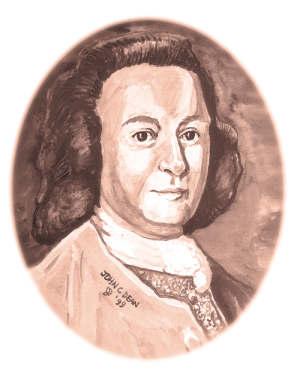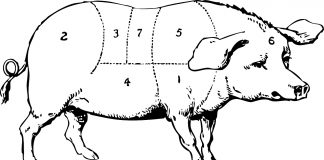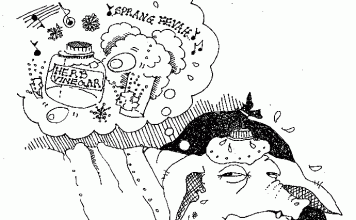 |
|
| Issue #60a • November/December, 1999 |
“The election’s next year, right?” I asked.
Dave Duffy, the publisher of Backwoods Home Magazine, was editing a rather lengthy article on water. I don’t know if he didn’t hear me or just didn’t realize I was talking to him. He didn’t say anything, so I repeated the question.
He turned when he realized I was talking to him. He looked up at the ceiling for just a second, then said, “Yeah, November 2000.”
He started to turn back to his work.
“Who do you think will be running?” I asked.
He hesitated. “Right now it looks like Bush and Gore.”
“Who do you think will win?”
He looked at me somewhat exasperated. “What are you asking for?”
“I’m trying to get some ideas for a column.”
He nodded. “If it’s a contest between those two, Bush is in the lead, just now, and I think he can maintain it. But who knows? In 1991, his father just came off winning Desert Storm and had one of the highest approval ratings for a President in history-92 percent or something like that-and Clinton was way back in the pack among the Democratic contenders. He didn’t even look like he’d be in the election. The next year, Clinton was on the way to the White House and Bush was heading for his vacation home in Maine to retire.”
I nodded and he returned to his work. But I wanted a more definitive opinion, so I looked across the room at Mac. O.E. MacDougal is our poker-playing friend from southern California. He was up for another round of battle with the local fish. “What do you think?” I asked him.
He looked up. “Who do I think will win the 2000 presidential election?”
“Yeah.”
“It’s going to be someone I’m not going to like.”
“But who do you think it’s most likely to be?”
“Dave’s right, it’s too early to tell. It’s such a long way from here to election, and early front-runners have a way of fading. By November of next year I’d guess there’s a 50 percent chance that the person who gets elected will be someone no one would give much of a chance to today. But the man to beat right now is George W. Bush.”
“Who do you think is the best man for the job?”
“Ron Paul.”
Dave turned around again and I gave him that “who-in-the-world-is-that” look.
“Ron Paul was the Libertarian candidate in 1992, wasn’t he?” Dave asked.
“1988,” Mac said. “He’s a Republican congressman from Texas now.”
“Why do you like him?” I asked.
“At the national level, he’s closer to the Founding Fathers than anyone else I can think of-more of a constitutionalist, if you know what I mean.”
“Is there a way to find out more about him?” I asked.
“He has a web site.”
(I did a quick websearch as we talked and there he was at http://www.house.gov/paul/display.htm)
“I also like Dick Armey,” Mac continued, “because he’s an economist and a lot of his beliefs parallel Paul’s.
“And I’d give a nod to the new Minnesota governor, Jesse Ventura. I know, when he runs for any office again, the media will focus on the clownish aspects of wrestling, but what’s more important is that, though he ran on the Reform ticket, his beliefs are at odds with the Reform Party platform and are more in line with the Libertarians.”
“At odds, how?” I asked.
“The Reform Party’s motto is, ‘less government.’ But, starting even with the party’s founder, Ross Perot, every solution they propose to the problems that face us in society is a government solution. Their programs are really no different from what the Republicans and Democrats offer.”
“Then why did so many people vote for Perot?” I asked.
“In voting for so-called ‘change,’ the electorate unwittingly chose something familiar.”
“How’s Ventura so different?”
“Listen to what he says; at heart he’s a Libertarian. He genuinely believes in getting government off our backs. With any luck he’ll either move over to the Libertarian Party and give them a presence or he’ll reshape the Reform Party into something that offers the American people a real and rational choice.”
“Do you think the Republicans would ever nominate Ron Paul?” I asked.
He laughed. “Not a chance.”
“Hey, Mac, who do you think is the greatest American never to be president?” Dave asked.
Without hesitation he said, “George Mason.”

George Mason
Now Dave gave me the same who-in-the-world look I had given him moments before.
Dave asked, “In 30 words or less, who is he?”
Mac opened his mouth to say something, but he looked at me for a moment, then back at Dave. “He’s a contemporary of Washington and Jefferson and you can thank him for the Bill of Rights-that’s 17 words.”
“I thought we had Jefferson or Madison to thank for the Bill of Rights,” I said.
“No, Jefferson endorsed the concept, but he wasn’t the originator. And Madison steered it through the Congress, but the ideas weren’t his. As a matter of fact, the irony is that even though Madison honchoed the legislation through the Congress, he originally opposed including a bill of rights in the Constitution.”
“Really?” Dave asked.
“Yeah.”
Dave thought a second. “George Mason, huh? What else can you tell me about him?”
“Do you guys want to get me started?” Mac asked.
“Is there a lot to say?” Dave asked.
“It depends on how much you want to know about him.”
“How important was he?”
“I could make a short list and title it ‘The most important Americans you never heard of,’ and Mason’s name would head it.”
Dave drummed his fingers on his desk. I grabbed the World Almanac from the bookshelf.
“You won’t find him in there,” Mac said.
I looked anyway. He was right.
“You’ve got me interested,” Dave finally said.
Mac began: “If any other man deserves to have his name mentioned in the same sentence as Washington, Jefferson, Madison, Benjamin Franklin, Thomas Paine, or any of the other Founding Fathers, it’s Mason.”
“Did Jefferson know who he was?” Dave asked.
“He knew him personally. So did Washington, Madison, Paine, Henry, the Adamses, and the others. Mason was a Virginian. He was about 18 years older than Jefferson and had a profound influence on him. Jefferson never made a secret of the fact that he revered him. He called him the wisest man of his generation. Even Madison, who is generally credited with framing the Bill of Rights, and who became the fourth President, considered Mason one of the most profound and penetrating thinkers of his time. And he was right. Washington himself called upon him many times. In fact, many of the Founding Fathers, whose names nowadays roll off the tongues of school children, knew who he was, were influenced by him, and sought his advice.”
“I can’t believe this guy could be so important but I’ve never heard of him,” Dave said. “Is this some kind of a joke?” he asked suspiciously.
Mac laughed and shook his head.
“Okay,” Dave said, threw his feet up on his desk and leaned way back in his chair. “Tell me all about this guy.”
“You’ve got an issue to turn out,” Mac said knowing we were in deadline.
“We’re taking a break.”
The Declaration of Rights
“Mason’s fellow Virginians, and this included the lawyers, deferred to him with the acknowledgement that no one else in the colony knew the colonial laws as well as he. It was also a tacit acknowledgement of his capabilities and honesty. In a six week period, during May and June of 1776, he wrote the state’s constitution and its bill of rights, called the Virginia Declaration of Rights.
The Declaration of Rights was adopted in June, three weeks before the Declaration of Independence was signed at the Continental Congress. In it he held that ‘All men are by nature born equally free and independent’ and ‘that all power was originally lodged in, and consequently derived from, the people.'”
“Those words sound familiar,” I said.
“Of course they do. Jefferson paraphrased them in the preamble to the Declaration of Independence.”
“Did Jefferson give Mason credit?”
“The others at the Continental Congress knew where the words came from. Mason’s Declaration had been copied and sent to the other colonies. Up and down the Atlantic seaboard it was read aloud in public places, printed in newspapers, considered, debated, and admired. There wasn’t a man at the Congress who hadn’t seen the Declaration or knew who its author was. And one after another, first Pennsylvania, then Maryland, then Delaware, then North Carolina and others took most or all of the Declaration of Rights and either made them amendments to their own constitutions or incorporated them directly into their constitutions.”
“Did Mason realize this?” Dave asked.
“Of course he did, as did others like Washington, Jefferson, and Madison.
“Even the French used it as a model when they wrote their Declaration of the Rights of Man and the Citizen in 1789.”
“Then he made a big impression in his day,” I said.
“He did, but not all of it was favorable. Quite a few of his contemporaries took exception to his words that ‘all men are created equally free and independent.’ At issue was slavery and quite a few people felt those words written by Mason could inspire slaves to revolt.
“But Mason, though a slave owner, had come to find slavery reprehensible and morally indefensible. Furthermore, he questioned its economic principles and said it actually hurt the economy of the southern states. Economists have since pointed out that he was right.
“But the death knell for slavery came only with the concept that all men possess natural rights. It started with English philosophers, particularly John Locke. But it saw its very first application, its first appearance in a government document, in Mason’s Virginia Declaration of Rights and it spread like wildfire through the colonies, to the chagrin of many slave owners. After the other states incorporated his Declaration into their own constitutions many of them then abolished slavery as unconstitutional.
“But slavery wasn’t the only issue that made him unpopular. Though a member of the Anglican Church, he found continuing to maintain the Anglican Church as the official church of Virginia, supported by taxes so that its clergymen were paid by the state, objectionable. Sentiments like these did not make many of his fellow Virginians very happy.
“In the meantime, he was also busy with other things. He assisted in the formation and maintenance of Virginia’s militia, he was called upon by lawyers when they began to revise the old laws and create new ones for the commonwealth, and, after the war began, Washington asked him to take the lead in helping control the inflation which threatened to wreck the economy of all of the new states.
The Constitution
“Between the end of the Revolutionary War, in 1783, and the Constitutional Convention, in 1787, Mason took some stances that didn’t make him popular with his fellow Americans. For instance, he didn’t believe, despite the war with Britain, that Americans should use the war as an excuse to renege on their debts to British merchants. Many of his countrymen would loved to have done this, but, as he pointed out, it wasn’t with the merchants they’d been fighting.
“But even more pressing problems faced the new nation. The united front displayed by the separate states, that had existed in the face of war, dissolved when independence was won and the fledgling country needed men like Mason to guide them through the tough times ahead. But after the War for Independence he found his council was less sought. Those in politics did not put much faith in the words of someone who chose not to get involved. Yet, the new nation, established with the Articles of Confederation in 1777, was foundering. After 10 years representatives from each state agreed to meet to try to fix the problems by amending the Articles of Confederation at a Congress in Philadelphia.
Mason was among those called upon. He grudgingly said he would reenter public life and, for the first time, he would even serve outside Virginia. The trip to Philadelphia would be the longest trip of his life. But we’re lucky he made it. Over the next three and a half months his inputs profoundly determined the future course the United States was to take.
“As I said, what these guys were supposed to be doing was amending the Articles of Confederation, which were the framework for the new United States, but once they got to Philadelphia what they did was to propose a whole new government. They wrangled for most of the summer creating a new government that would have more power and run more efficiently than it did under the Articles of Confederation, and finally, in September of 1787, most of the delegates to the convention were ready to wrap up business.
“Only Madison had had a greater input into the new Constitution than Mason, and during the Convention Mason, though older than most of the delegates, proved himself to still be a master debater and able politician.
“But with the Convention drawing to a close and the other delegates wanting to go home, it’s ironic that the man who hated public service, who was always late and often absent from meetings of government, wanted the Convention to go on. And if not continue, he wanted another Convention scheduled for later. He felt there were matters that still had to be addressed. He still felt the federal government, including the Presidency, was too strong and would be a sleeping monster that would eventually crush the people. But foremost was his concern that the delegates had neglected to include a declaration of rights. He offered to the Convention a list of his objections beginning with the words, ‘There is no Declaration of Rights…’ But in the end, the other delegates spurned his suggestions.
“They just wanted to get out of Philadelphia,” Dave said.
“That’s right. But you’ve got to understand, Mason, like the others wanted an effective national government. But he wanted more safeguards built in. For instance, he didn’t want a standing army. He wanted a militia that would be called up in time of war. But he did not want Congress to control the militia; he wanted that to remain in the hands of the people and the states. This was just one of the problems he felt was unresolved by the delegates.
“Why was he opposed to the existence of a standing army?” Dave asked.
“It entices foreign adventures-the European armies were constantly busy-and eventually it would be used as a police force.
“He also felt the Constitution was unnecessarily vague in its wording. Among other things, he objected to inclusion of the words to ‘promote the general welfare’ as part of the preamble, seeing it as a catchall clause that provides an opportunity for abuse by the government, particularly in the absence of a Bill of Rights.
“He also regretted the compromise position the Congress took on slavery. Even as a slave owner, he wanted a way to rid the country of the institution.
“He didn’t like the provision that allows treaties, which are enacted by the President and two thirds of the Senate, to become the law of the land without first being reviewed by people’s representatives in the House.
“He would have been a believer in term limits. He believed those who served in government should serve, then return to the position of private citizens to live under the laws and policies they had created.
“Although nowhere in the Constitution are there provisions for the courts to rule unconstitutional laws passed by Congress to be void, Mason believed such powers should exist and that came about during the tenure of John Marshall as Chief Justice of the United States Supreme Court, in 1803 (Marbury vs. Madison). Still, nowhere in the Constitution is this a power specifically granted to the Supreme Court. But what Mason did fear about a federal judiciary was that it would render the state courts powerless. He wanted safeguards against that.
“Though many of the provisions he wanted included in the Constitution were not adopted, many others were. There were proposals to make each state’s representation in the House to be based on wealth. This would have given Mason’s state, Virginia, the most representation, but he opposed it. He wanted representative democracy and that’s what we got.
“He believed the Senate should not be popularly elected. If the House was to represent the people, the Senate was to represent the states and, until 1913, senators were appointed by the state legislatures.
“Mason had been the chief proponent of the idea that appropriations bills should originate in the House and never the Senate. He was hoping that the way the federal government spends its money would more accurately reflect the will of the people.
“He also believed the House should be constantly subject to reapportionment as the country expanded. He realized that this would eventually erode Virginia’s power in the federal government as new states were added and the population spread westward. He also wanted to ensure that as new states were admitted, they would come into the Union as equals with the existing states. This meant that neither the old states nor their citizens would have any advantage. He wanted the nation’s capital separate from any of the state capitals, thus ensuring the formation of an independent district, Washington, DC.
“He wanted to ensure that representatives had to live in the district they represented, that money bills originate in the House where he felt the will of the people-and the source of the money-lay, and he wanted a certain minimum time of citizenship to be able to serve in either the House or the Senate. These were all provisions that were included.
“He wanted and got provisions to allow the impeachment of a corrupt President. He also wanted the power to declare war to rest with the Congress, not the President. Military adventures should be the will of the people, not the government.”
“But today Presidents can get us involved in conflicts without declaring war,” I said.
“Mason’s probably whirling in his grave like a dervish,” Mac said.
“How did the other delegates feel about these things?” I asked.
“More often than not, he wasn’t the only delegate who called for all of these measures, but he was often the most vocal and persuasive and he had a single motive: More than anything he wanted a strong government that expressed the will of the people, and allowed the individual maximum freedom.
“But he also didn’t want a government that allowed the tyranny of the majority, either. Among other things he wanted a provision that commercial laws could not be passed without two thirds majority in both the House and Senate to pass them. What he feared was that the populous northern states would engage in economic tyranny of the majority over the less populous southern states.
The Convention adjourns
“But almost all the other delegates present felt it was time to sign the document and submit it to the states. Some of the delegates had already left weeks earlier so they couldn’t sign it, but Randolph and Mason of Virginia and Gerry of Massachusetts were there and they refused to sign it.
“This left the other delegates in a quandary because they wanted a show of unanimity before the new Constitution was presented to the states, and all those still in attendance were expected to sign it. When it became apparent that persuasion wasn’t going to work, Gouverneur Morris of Pennsylvania-Gouverneur was his first name, not a title-offered a solution that appeased most of the delegates: since a majority of the Virginia and Massachusetts delegate did sign it, the document should include the phrase ‘unanimous consent of the states present’ and not ‘unanimous consent of all the delegates.’ It was a trick of wording, but Morris’s proposal was accepted.
“It was on this note the Constitutional Convention ended with the delegates returning to their homes. But Mason wasn’t happy. He still had his list of objections that he displayed to anyone who wanted to see them.
“Eventually, they appeared in a pamphlet titled Objections to this Constitution of Government which was circulated throughout the states. He personally sent copies to Washington, Jefferson, and other influential men. His list was longer now. He had added to them, protesting the regulation of the militia by the government, the power of Congress to vote itself pay raises, and other matters.
“The Federalists, as those who supported the ratification of the Constitution had come to be known, united to support the Constitution as it stood, and to oppose Mason. Several of the essays in the Federalist Papers addressed Mason’s objections point by point.
“Jefferson, from his post in France, where he was ambassador, took Mason’s side, writing to Madison and others, threatening to call another Constitutional Convention and even work toward breaking up the Union unless a declaration of rights was included. The Constitution hung in the balance.
“Ultimately, it was by promising a declaration of rights that the Federalists started winning the opposition-now called the Anti-Federalists-over to their side.”
“You mean, to get the Constitution approved, they now had to promise the very thing they had rejected in the Convention?” Dave asked.
“Yes.”
“What made anyone think they were going to keep their promise once it was ratified? Politicians are famous for reneging on campaign promises.”
“The Federalists, Madison among them, were winning the debates against the Anti-federalists in the state legislatures, but they saw the writing on the wall. Even as the state legislatures ratified it, the one and only state that allowed ratification by popular vote-Rhode Island-rejected it. And in the other states there was a popular cry for a declaration of rights-a Bill of Rights. The guarantee of rights was what the people wanted, and Mason forecast a civil war if they didn’t get what they wanted. So, to ensure winning a seat in the first Congress, Madison discovered that one of his campaign promises had to be that he would introduce a bill of rights, and everyone knew what that meant-he was going to push Mason’s Declaration of Rights.
“But Madison personally still didn’t like the idea. He was sure, and history has borne out his prediction, that any rights not specifically mentioned in the Constitution would be denied. It is on this basis the FDA, motor vehicle departments, and the IRS, among others, have denied us any rights not specifically mentioned in the Constitution. And though the 9th and 10th Amendments were included in the Constitution to prevent this very thing from happening, they may as well not exist. The government has argued from day one that anything not specifically mentioned in the Bill of Rights isn’t a right, and it has invariably won.”
“What did Mason say to this Federalist argument?” Dave asked.
“He pointed out that it was a lack of written rights that had precipitated the recent revolution because the King and the Parliament felt they could safely ignore anything not written.
“But because of his opposition to ratification, Mason became the subject of various smear campaigns. He was ridiculed as doddering and foolish.”
“How did he take that?” I asked.
“One man said it was widely known to the public that Mason’s mind was failing. Mason replied, ‘Sir, when yours fails, nobody will ever discover it.’
“Few stood by him or still regarded him as a friend, though there was still a small circle of devoted followers, among whom was the great orator, Patrick Henry, who was his ally in opposing ratification. And though the man who quoted him in the Declaration of Independence, Thomas Jefferson, had changed his position and he now concurred with the position Massachusetts took, ratify the Constitution now with the recommendation that a bill of rights be added later, arguing that otherwise the entire United States might fall apart, he remained an admirer of Mason.
“But one by one the states ratified the Constitution. Only 9 of the 13 states were needed for ratification to make the document official and, with ratification by New Hampshire, on June 21, 1788, the Constitution was the law of the land. Though word from New Hampshire wouldn’t reach Virginia for several more days, no one kidded themselves; if New York and Virginia, the two most populous and important states, failed to ratify the Constitution, the Union could not stay together. So the struggle in Virginia continued. But even with Mason and Patrick Henry opposing it, opposition to ratification was caving in, particularly with the Federalists now promising a declaration of rights, and on June 25, 1788 Virginia ratified it. Just over a month later, New York followed suit and the viability of the United States was assured.
“But ratification now presented a dilemma to the Anti-federalists. Many of them still opposed the Constitution but Article VI states that to serve, all executive and judicial office holders, at both the national and state level, were bound by oath to support the Constitution. To continue in his posts, Mason had to swear an oath to the very document he was protesting.
“In the end he resigned from the Fairfax County Court and left public service. In 1790, he was appointed by the Virginia legislature to the United States Senate, but he refused to serve, thus avoiding the necessity of swearing an oath.
“A beaten man, he felt he had lost the most important battle of his life, along with almost all his friends.
The Bill of Rights
“Madison, running for Congress against another future President, James Monroe, was now forced to take up the baton and campaign on the promise that Congress should enact a bill of rights. He told his fellow congressmen they should act on this while the glow of the Revolution was still upon them, that if it wasn’t done soon the urgency would eventually become cold and a bill of rights would never pass.”
“So now he was one of the most ardent advocates for a bill of rights,” Dave said.
“Yes, and the amendments to the new Constitution that he presented to the Congress were culled from Mason’s Declaration.
“It’s ironic that Madison is now remembered as the prime creator of the Bill of Rights when he in fact initially opposed it and only supported it when forced to.
“It’s also ironic that Mason, if remembered at all, is remembered only as one of the three Convention delegates who refused to sign the Constitution, when he had, in fact, more to do with shaping the good aspects of it than anyone but Madison.
“It is because of Mason that the First Ten Amendments now exist. Without him I doubt there would have been a Bill of Rights.”
“What happened to Mason?” Dave asked.
“He went back to Gunston Hall to live out his life, and shortly after his retirement he died-on October 7, 1792, but not without seeing the Bill of Rights adopted, on December 15, 1791. Madison, in the meantime, resumed his friendship with him, and Jefferson, as ever, remained his friend. But Washington, a friend since childhood, never forgave him for his opposition and never spoke to him again.
“Not long after he died Mason was forgotten by his countrymen and history. There was a county in Kentucky named in his honor, and George Mason University was founded in 1957 in Fairfax, Virginia, but not much else. Today, if he is remembered at all, it is usually as the cantankerous old man who opposed the ratification of the Constitution, but few know why. For years he lay in an unmarked grave at Gunston Hall.
“Only recently have Americans rediscovered him, though the number who have is still damned few. Here and there you can find people who know he wrote the Virginia Declaration of Rights. Fewer still know he was the force behind the Bill of Rights-the First Ten Amendments of the United States Constitution. And even fewer realize that he influenced the Constitutions of most of the states, the French Declaration of the Rights of Man and the Citizen, and the United Nations Universal Declaration of Human Rights. In Jefferson’s own words, Mason was ‘of the first order of greatness,’ and he was right.
“There haven’t been many documents in history, such as the Virginia Declararion of Rights, that have had such a huge impact on mankind, but where the author received so little recognition. It’s like Christians knowing what the Bible is and who the Apostles were, but not knowing who Christ was.
“In many ways, the Virginia Declaration of Rights is more powerful than the United States Constitution itself. If there’s any shortcoming in the Constitution, it’s that it doesn’t go as far as Virginia’s Declaration of Rights. The Declaration of Rights is more or less an amalgam of both the U.S. Bill of Rights and the opening words of the Declaration of Independence and it contains not only our rights, but words that say that those who serve in government are there at our pleasure and are answerable to us at all times. And at any time, the government and those who serve in the government, can be replaced at the people’s pleasure. Those words should have been included in our Constitution to serve as a reminder not only to the those who serve, but the people themselves.
“How different would this country be had he never lived?” Dave asked.
“I will state flatly that even if there had never been a Jefferson, there would still have been a Declaration of Independence; had Washington never been born, American troops would still have won the Revolutionary War-perhaps quicker. But, though others called for a bill of rights, were it not for George Mason, there simply would not have been one.
“In my opinion, he was the greatest American never to be President.”
“How do you feel about his objections to the Constitution?” Dave asked.
“There are certain powers he wanted retained by the states that would have made the country too fragmented, but in general his objections were on the mark.”
“What kind of President would he have made?” I asked.
“There’s no real way to know for certain, but here was a guy who risked his life and property to support the Revolutionary War, who denounced slavery when he knew it could hurt his livelihood, and who lost almost all of his friends in a battle to ensure individual rights for everyone. But best of all he probably wouldn’t have wanted the job, so he’d probably have been one of the best.”
He left it there and none of us spoke. But I don’t think we were sitting there for more than a few minutes when a voice asked, “Why aren’t you guys working?”
It was Ilene, Dave’s wife and also the business manager of the magazine. She’d just walked into the office and there was Dave, his feet still up on his desk, me slouched back in my chair, and Mac teetering back in his own chair as he faced us.
“Mac’s just telling us about George Mason,” Dave said.
She swept by us on her way to her desk. She got a lost look on her face for a moment, then said, “That’s the guy who was behind the Bill of Rights, wasn’t he?”
Dave looked stunned and I guess I did too.
“That’s right,” Mac said.
“There something wrong?” she asked.
“No,” Dave said.
“No, Ilene, there’s nothing wrong,” Mac added.
The Virginia Declaration of RightsAdopted unamimously June 12, 1776
A Declaration of Rights made by the representatives of the good people of Virginia, assembled in full and free Convention; which rights do pertain to them, and their posterity, as the basis and foundation for government. 1. That all men are by nature equally free and independent, and have certain inherent rights, of which, when they enter into a state of society, they cannot, by any compact, deprive or divest their posterity; namely, the enjoyment of life and liberty, with the means of acquiring and possessing property, and pursuing and obtaining happiness and safety. 2. That all power is vested in, and consequently derived from, the people; that magistrates are their trustees and servants, and at all times amenable to them. 3. That government is, or ought to be, instituted for the common benefit, protection, and security, of the people, nation, or community, of all the various modes and forms of government that is best, which is capable of producing the greatest degree of happiness and safety, and is most effectually secured against the danger of mal-administration; and that, whenever any government shall be found inadequate or contrary to these purposes, a majority of the community hath an indubitable, unalienable, and indefeasible right, to reform, alter, or abolish it, in such manner as shall be judged most conducive to the publick weal. 4. That no man, or set of men, are entitled to exclusive or separate emoluments or privileges from the community, but in consideration of publick services; which, not being descendible, neither ought the offices of magistrate, legislator, or judge, be hereditary. 5. That the legislative and executive powers of the state should be separate and distinct from the judicative; and, that the members of the two first may be restrained from oppression, by feeling and participating the burdens of the people, they should, at fixed periods, be reduced to a private station, return into that body from which they were originally taken, and the vacancies be supplied by frequent, certain, and regular elections, in which all, or any part of the former members, to be again eligible, or ineligible, as the laws shall direct. 6. That elections of members to serve as representatives of the people, in assembly, ought to be free; and that all men, having sufficient evidence of permanent common interest with, and attachment to, the community have the right of suffrage, and cannot be taxed or deprived of their property for publick uses without their own consent, or that of their representatives so elected, nor bound by any law to which they have not, in like manner, assented, for the publick good. 7. That all power of suspending laws, or the execution of laws, by any authority without consent of the representatives of the people is injurious to their rights, and ought not to be exercised. 8. That in all capital or criminal prosecutions a man hath a right to demand the cause and nature of his accusation, to be confronted with the accusers and witnesses, to call for evidence in his favour, and to a speedy trial by an impartial jury of his vicinage, without whose unanimous consent he cannot be found guilty, nor can he be compelled to give evidence against himself; that no man be deprived of his liberty except by the law of the land, or the judgement of his peers. 9. That excessive bail ought not to be required, nor excessive fines imposed, nor cruel and unusual punishments inflicted. 10. That general warrants, whereby any officer or messenger may be commanded to search suspected places without evidence of a fact committed, or to seize any person or persons not named, or whose offense is not particularly described and supported by evidence, are grievous and oppressive and ought not to be granted. 11. That in controversies respecting property, and in suits between man and man, the ancient trial by jury is preferable to any other, and ought to be held sacred. 12. That the freedom of the press is one of the greatest bulwarks of liberty, and can never be restrained but by despotick governments. 13. That a well regulated militia, composed of the body of the people, trained to arms, is the proper, natural, and safe defense of a free state; that standing armies, in time of peace, should be avoided as dangerous to liberty; and that, in all cases, the military should be under strict subordination to, and be governed by, the civil power. 14. That the people have a right to uniform government; and therefore, that no government separate from, or independent of, the government of Virginia, ought to be erected or established within the limits thereof. 15. That no free government, or the blessings of liberty, can be preserved to any people but by a firm adherence to justice, moderation, temperance, frugality, and virtue, and by frequent recurrence to fundamental principles. 16. That religion, or the duty which we owe to our Creator, and the manner of discharging it, can be directed by reason and conviction, not by force or violence; and therefore all men are equally entitled to the free exercise of religion, according to the dictates of conscience; and that it is the mutual duty of all to practice Christian forbearance, love, and charity, towards each other. |
Objections to this Constitution of Governmentby George Mason
There is no Declaration of Rights, and the laws of the general government being paramount to the laws and constitution of the several States, the Declarations of Rights in the separate States are no security. Nor are the people secured even in the enjoyment of the benefit of the common law. In the House of Representatives there is not the substance but the shadow only of representation; which can never produce proper information in the legislature, or inspire confidence in the people; the laws will therefore be generally made of men little concerned in, and unacquainted with their effects and consequences. The Senate have the power of altering all money bills, and of originating appropriations of money, and the salaries of the officers of their own appointment, in conjunction with the president of the United States, although they are not the representatives of the people or amendable to them. These with their other great powers, viz.: their power in the appointment of ambassadors and all public officers, in making treaties, and in trying all impeachments, their influence upon and connection with the supreme Executive from these causes, their duration of office and their being a constantly existing body, almost continually sitting, joined with their being one complete branch of the legislature, will destroy any balance in the government, and enable them to accomplish what usurpations they please upon the rights and liberties of the people. The Judiciary of the United States is so constructed and extended, as to absorb and destroy the judiciaries of the several States; thereby rendering law as tedious, intricate and expensive, and justice as unattainable, by a great part of the community, as in England, and enabling the rich to oppress and ruin the poor. The President of the United States has no Constitutional Council, a thing unknown in any safe and regular government. He will therefore be unsupported by proper information and advice, and will generally be directed by minions and favorites; or he will become a tool to the Senateor a Council of State will grow out of the principal officers of the great departments; the worst and most dangerous of all ingredients for such a council in a free country; From this fatal defect has arisen the improper power of the Senate in the appointment of public officers, and the alarming dependence and connection between that branch of the legislature and the supreme Executive. Hence also sprung that unnecessary officer the Vice-President, who for want of other employment is made president of the Senate, thereby dangerously blending the executive and legislative powers, besides always giving to some one of the States an unnecessary and unjust preeminence over the others. The President of the United States has the unrestrained power of granting pardons for treason, which may be sometimes exercised to screen from punishment those whom he had secretly instigated to commit the crime, and thereby prevent a discovery of his own guilt. By declaring all treaties supreme laws of the land, the Executive and the Senate have, in many cases, an exclusive power of legislation; which might have been avoided by proper distinctions with respect to treaties, and requiring the assent of the House of Representatives, where it could be done with safety. By requiring only a majority to make all commercial and navigation laws, the five Southern States, whose produce and circumstances are totally different from that of the eight Northern and Eastern States, may be ruined, for such rigid and premature regulations may be made as will enable the merchants of the Northern and Eastern States not only to demand an exorbitant freight, but to monopolize the purchase of the commodities at their own price, for many years, to the great injury of the landed interest, and impoverishment of the people; and the danger is the greater as the gain on one side will be in proportion to the loss on the other. Whereas requiring two-thirds of the members present in both Houses would have produced mutual moderation, promoted the general interest, and removed an insuperable objection to the adoption of this government. Under their own construction of the general clause, at the end of the enumerated powers, the Congress may grant monopolies in trade and commerce, constitute new crimes, inflict unusual and severe punishments, and extend their powers as far as they shall think proper; so that the State legislatures have no security for the powers now presumed to remain to them, or the people for their rights. There is no declaration of any kind, for preserving the liberty of the press, or the trial by jury in civil causes; nor against the danger of standing armies in time of peace. The State legislatures are restrained from laying export duties on their own produce. Both the general legislature and the State legislature are expressly prohibited making ex post facto laws; though there never was nor can be a legislature but must and will make such laws, when necessity and the public safety require them; which will hereafter be a breach of all the constitutions in the Union, and afford precedents for other innovations. This government will set out a moderate aristocracy: it is at present impossible to foresee whether it will, in its operation, produce a monarchy, or a corrupt, tyrannical aristocracy; it will most probably vibrate some years between the two, and then terminate in the one or the other. The general legislature is restrained from prohibiting the further importation of slaves for twenty odd years; though such importations render the United States weaker, more vulnerable, and less capable of defence. |














